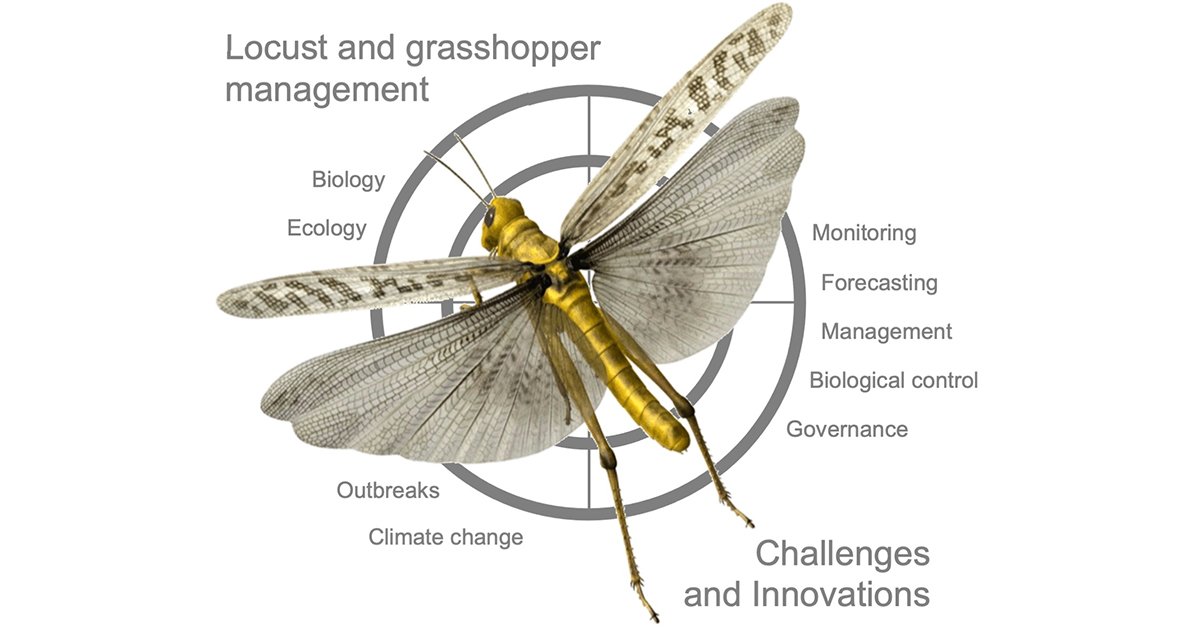- 3.4Impact Factor
- 6.7CiteScore
- 18 daysTime to First Decision
Locust and Grasshopper Management: Challenges and Innovations
This special issue belongs to the section “Pest and Disease Management“.
Special Issue Information
Dear Colleagues,
Locusts and grasshoppers threaten global agriculture and livelihoods, causing severe economic, social, and environmental impacts. Their highly migratory nature and ability to form massive swarms make them a priority for national and international management efforts. Recent major outbreaks, such as the 2020 desert locust crisis across Africa and Asia, highlight the urgent need for improved control strategies.
Managing these pests is highly complex due to their rapid reproduction, climate change influences, and vast affected regions, compounded by political, financial, and security challenges. At the same time, chemical pesticides remain the dominant control method, and concerns about health, biodiversity, and sustainability drive interest in alternative solutions.
This Special Issue will explore advances in locust management, including bio-ecology, monitoring technologies, forecasting models, and biopesticides. It will also address governance challenges and sustainable control strategies. It highlights recent research and innovations to support scientists, policymakers, and practitioners in developing more effective and sustainable locust management approaches.
Dr. Michel Lecoq
Prof. Dr. Long Zhang
Guest Editors
Manuscript Submission Information
Manuscripts should be submitted online at www.mdpi.com by registering and logging in to this website. Once you are registered, click here to go to the submission form. Manuscripts can be submitted until the deadline. All submissions that pass pre-check are peer-reviewed. Accepted papers will be published continuously in the journal (as soon as accepted) and will be listed together on the special issue website. Research articles, review articles as well as short communications are invited. For planned papers, a title and short abstract (about 250 words) can be sent to the Editorial Office for assessment.
Submitted manuscripts should not have been published previously, nor be under consideration for publication elsewhere (except conference proceedings papers). All manuscripts are thoroughly refereed through a single-blind peer-review process. A guide for authors and other relevant information for submission of manuscripts is available on the Instructions for Authors page. Agronomy is an international peer-reviewed open access monthly journal published by MDPI.
Please visit the Instructions for Authors page before submitting a manuscript. The Article Processing Charge (APC) for publication in this open access journal is 2600 CHF (Swiss Francs). Submitted papers should be well formatted and use good English. Authors may use MDPI's English editing service prior to publication or during author revisions.
Keywords
- locusts
- pests
- outbreaks
- invasions
- monitoring and forecasting
- preventive management strategy
- food crisis
- biological control
- sustainability
- environmantal impact

Benefits of Publishing in a Special Issue
- Ease of navigation: Grouping papers by topic helps scholars navigate broad scope journals more efficiently.
- Greater discoverability: Special Issues support the reach and impact of scientific research. Articles in Special Issues are more discoverable and cited more frequently.
- Expansion of research network: Special Issues facilitate connections among authors, fostering scientific collaborations.
- External promotion: Articles in Special Issues are often promoted through the journal's social media, increasing their visibility.
- e-Book format: Special Issues with more than 10 articles can be published as dedicated e-books, ensuring wide and rapid dissemination.

